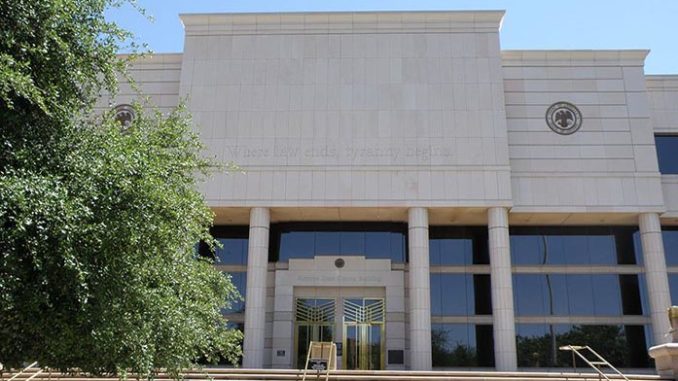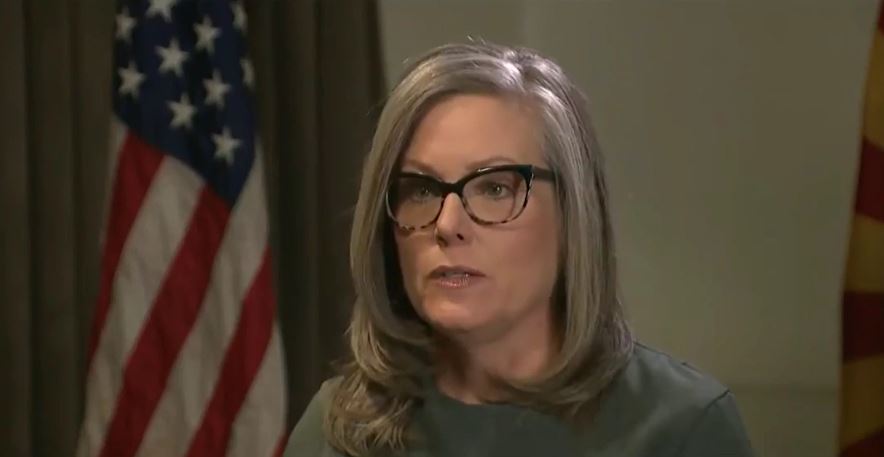
by Matthew Holloway | Sep 14, 2025 | Education, News
By Matthew Holloway |
A dozen Maricopa County libraries have removed more than 50 books on sex education and puberty from their children’s sections. The move follows complaints from parents and advocacy groups who said the books contained inappropriate material.
As previously reported by AZ Free News, the Maricopa County Library District (MCLD) has been subject to increasing criticism from parents’ rights advocates like Arizona Women of Action (AZWOA) and EZAZ, who engaged with the Maricopa County Board of Supervisors (BOS) in June. The groups objected to books such as “It’s Perfectly Normal” by Robie H. Harris and “This Book Is Gay” by Juno Dawson for the titles’ graphic depictions of sex and sexual behavior.
Responding to a petition launched by AZWOA, the BOS approved a pilot program at the Queen Creek Library, allowing parents to submit a form listing books their children may not check out.
According to AZCentral, the Board later directed the books to be relocated in response to the concerns brought to them. Due to the administrative nature of the move, a formal vote was not required. Supervisor Steve Gallardo, the board’s only Democrat, expressed objections to the outlet, saying, “Call it whatever you want … it’s wrong, and we shouldn’t be engaging in this.” Gallardo claimed that although he “agreed with some of the changes,” parents should be responsible for monitoring their children in the libraries.
Republican Supervisors Lesko, Stewart, and Brophy McGee supported the measure fully, stating that the measure is intended to:
- “Protect our youngest from their prying eyes and curiosity,” per Stewart.
- “Relocate questionable books into areas of the library that are less, or not, accessible to children,” according to Brophy-McGee.
- “Make sure that sexually explicit library books are out of the reach of minors,” as described by Lesko.
As reported by the Arizona Daily Independent, several books were brought to the BOS’s attention, though the complete list of inappropriate books is extensive. The AZWOA referred to a book rating site, ratedbooks.org, as well as a book list on Scottsdaleunites.com.
Merissa Hamilton of EZAZ later posted a list of egregious books found on MCLD shelves. Highlighted titles include “It’s Perfectly Normal: Changing Bodies, Growing Up, Sex, and Sexual Health” by Robie H. Harris, which features cartoon-like drawings with sexually graphic information. “This Book Is Gay” by Juno Dawson is also in question because it instructs children on how to engage in meetups for casual sexual encounters. Novels by Ellen Hopkins graphically depict sex, human trafficking, and abuse. These books may violate state statutes, including ARS 13-3506:
“It is unlawful for any person, with knowledge of the character of the item involved, to recklessly furnish, present, provide, make available, give, lend, show, advertise, or distribute to minors any item that is harmful to minors. C. A violation of this section is a Class 4 felony.”
These library books may also violate ARS 13-3507:
“A. It is unlawful for any person knowingly to place explicit sexual material upon public display or knowingly to fail to take prompt action to remove such a display from property in his possession or under his control after learning of its existence. B. A person who violates any provision of this section is a Class 6 felony.
The potential prompted citizens to consider bringing these books to the attention of the county’s sheriff and attorney’s offices.
County Manager Jen Pokorski told Republic reporters in June that the county is contemplating a new rule, a new “software solution” which would permit parents to restrict their children’s access to different books by category.
“I think the goal of the new software would be, the books that we’ve deemed — or that have illustrative pornography, will be off limits to children under a certain age,” Supervisor Mark Stewart explained. “And then anything that a parent would want to opt their child into, they’re welcome to sign up and do that.”
However, he did clarify, to the Arizona Republic, “I did not say that sex-ed books are illustrative pornography.”
Matthew Holloway is a senior reporter for AZ Free News. Follow him on X for his latest stories, or email tips to Matthew@azfreenews.com.

by Matthew Holloway | Sep 14, 2025 | News
By Matthew Holloway |
Attorneys from the Goldwater Institute, representing the Center for Arizona Policy and the Arizona Free Enterprise Club, joined former Arizona Supreme Court Justice Andrew Gould on Thursday to challenge Proposition 211. The measure, called the “Voters’ Right to Know Act,” is being contested on the grounds that it violates the state Constitution’s protections for free speech and privacy.
In the wake of Turning Point USA co-founder Charlie Kirk’s assassination—and a decade marked by attacks on political figures—the security risks of effectively doxxing political donors loom large in the case.
If upheld, the law would force nonprofit groups that weigh in on ballot measures or reference incumbents near an election to publicly disclose their donors—not just names and amounts, but also home addresses and employers—in a searchable database.
In today’s climate of escalating political violence—from death threats and swatting to vandalism, arson, and even assassinations—a database like this could essentially become a “hit list.”
In a press release the Goldwater Institute explained its position stating, “While proponents of the Voters’ Right to Know Act say they’re simply combatting so-called ‘dark money’ in politics, it is clear to Goldwater and its clients — the Center for Arizona Policy, the Arizona Free Enterprise Club, and individual donors — that their real intent is to intimidate their political opponents into silence.”
“Arizona’s Proposition 211 is as un-American as it is dangerous. No one should be exposed to retaliation or violence simply for supporting causes they believe in,” said Jon Riches, Goldwater’s Vice President of Litigation. “The law also violates Arizona’s Constitution, which provides stronger protections for freedom of speech and privacy than even the U.S. Constitution. That’s why we at the Goldwater Institute believe the Arizona Supreme Court will ultimately strike down Proposition 211.”
Arizona Free Enterprise Club President Scot Mussi added, “They’re afraid of the activist organizations out there. They’re afraid of politicians and others that want to exact retaliation because they simply support a position or belief that they disagree.”
Mussi characterized the law as “a dangerous threat to our right to free speech and association.”
“As drafted, the law can be used to unconstitutionally target and harass private citizens, including our organization and our supporters,” Mussi stated. “We are confident that the Supreme Court will recognize the danger this law poses and will rule in our favor.”
In a statement to AZ Free News in May, Mussi elaborated on the potential for political intimidation: “Both the U.S. Constitution and the Arizona Constitution guarantee citizens the right to speak freely, which includes the right to not be forced to speak. Prop 211 not only violates this right for donors by silencing them from supporting causes they believe in but impairs the speech of nonprofits like ours as well.”
Peter Gentala, President of the Center for Arizona Policy, stated in a press release that Proposition 211 “creates an atmosphere of fear among those who support nonprofits that engage in the most pressing issues in Arizona today.”
Matthew Holloway is a senior reporter for AZ Free News. Follow him on X for his latest stories, or email tips to Matthew@azfreenews.com.

by Matthew Holloway | Sep 13, 2025 | News
By Matthew Holloway |
Judicial Watch, a conservative watchdog group, announced this week it has asked the City of Sedona to “review and revise” the Sedona Police Department’s warning shot policy. The group says the policy could have officers committing felonies.
The organization requested the review and revision of the SPD policy, according to a letter released by Judicial Watch Southwest Projects Coordinator Mark Spencer, a 25-year veteran, former Phoenix police officer, and former President of the Phoenix Law Enforcement Association.
In the letter, Spencer cited potential conflicts with A.R.S. §13-3107, known as Shannon’s Law, as well as standards set by the Arizona Peace Officer Standards and Training Board (AZPOST).
Judicial Watch reported in its statement that the organization’s intervention began with a public records request (PRR) to Sedona City Manager Annette Spickard regarding the SPD’s warning shot policy on July 28th. But according to the group, the request for records was not fully complied with:
“Judicial Watch sought various SPD documents, including training records, policy manuals, and communications related to the use of warning shots. However, many of the requested documents were not provided or available.
The responsive documents included 26 emails, which revealed a timeline of events and issues related to the warning shot policy. Notably, on April 18, 2023, an email indicated that a revised policy manual for SPD was under consideration, which included and allowed warning shots. Subsequent emails showed ongoing evaluations and suggestions for policy revisions, with some recommendations to exclude warning shots.”
According to Shannon’s Law, “A person who with criminal negligence discharges a firearm within or into the limits of any municipality is guilty of a class 6 felony.”
Judicial Watch cautioned that the use of a warning shot under current SPD policy could constitute a criminally negligent discharge under Shannon’s Law, making the officer following the policy guilty of a class 6 felony.
In the text of the letter, Spencer noted that among the 26 responsive emails received by Judicial Watch, “An email indicated that a revised policy manual for SPD was under consideration. “Warning shots” were acknowledged, included, and allowed in the policy. Within this email, it was also stated, “Officers are taught during their academy training about reasonable force, deadly force, warning shots (emphasis added), when and how to use non-deadly weapons, and when and how to use deadly force and firearms.”
Conversely, in a later email from Sedona’s outside legal counsel, Eric Edwards, policy revisions were submitted for the SPD officer’s manual addressing the use of “Warning Shots.” Edwards reiterated in the formal police policy that “Officers are taught during their academy training about… Warning Shots.” He then makes the following change in policy by suggesting, “Officers will not…Generally, fire warning shots.”
Spencer concluded, “Judicial Watch expressed concerns that the current policy may conflict with A.R.S. §13-3107, also known as Shannon’s Law, which could classify the use of warning shots as a class 6 felony. Additionally, they questioned the accuracy and consistency of the policy with AZPOST (State law enforcement certification agency) and other law enforcement standards. Judicial Watch has requested the City Council and City Manager to consider revising the SPD policy to eliminate the use of warning shots. They have indicated their intention to make a formal complaint to the Arizona Peace Officer Standards and Training Board (AZPOST) and the Arizona Attorney General’s office if the policy is not revised.”
As of this report, the City of Sedona has made no official statement regarding the Judicial Watch request.
Matthew Holloway is a senior reporter for AZ Free News. Follow him on X for his latest stories, or email tips to Matthew@azfreenews.com.

by Matthew Holloway | Sep 12, 2025 | News
By Matthew Holloway |
In the wake of Turning Point USA co-founder Charlie Kirk’s assassination, comments from Arizona Democrats and some media figures struck a sour note Thursday. Their remarks drew swift and widespread condemnation across social media.
Most prominently, an initial comment from Governor Katie Hobbs calling for “lowering the temperature of our politics” has generated outrage, seen by many as a critique of Kirk.
Hobbs wrote in a statement, “I am deeply saddened by the news of the assassination of Charlie Kirk. I am saddened for Charlie’s family, friends, and Arizonans as they mourn his loss, and I am saddened for our country as our politics have descended into horrific violence. This tragedy is not about who Charlie Kirk supported politically. It is about the devastating loss of a father, a neighbor, and an Arizonan who called this state home, and whose life was cut short by senseless violence.”
Hobbs’ statement took a turn, however, with her adding, “We must stand together in rejecting violence, lowering the temperature of our politics, and recommitting ourselves to the values of civility, respect, and community that American democracy requires.”
The comments from Arizonans in general and groups like the Arizona Free Enterprise Club (AZFEC) were immediate and scathing.
“Katie Hobbs uses Charlie Kirk’s assassination to lecture conservatives that they need to ‘lower the temperature.’ Everything Charlie did was civil, engaging political opponents in open dialogue with ideas and arguments. Sorry Katie, we won’t back down,” AZFEC posted on X.
Garrett Lewis, Host of The Afternoon Addiction on 550 KFYI, replied, “All Charlie did was have civilized discussions and he showed respect to everyone, including those that disagreed with him. You evil freak.”
Pro-life commentator ‘Sanctity of Life’ responded with a harsh critique writing, “What should concern you and others who are prominent in the Democrat party is to change the tone of the party rhetoric that incites violence. Until that happens no one will take you Democrats seriously. We’re sick of being demonized and threatened for disagreeing with you!”
Gerald Bourguet, the now-former Lead Suns writer for PHNX Sports and co-host of the Phoenix Suns Podcast, was severely criticized after posting a lengthy thread blasting Kirk just hours after his death. The post resulted in PHNX Sports making “the decision to part ways,” early Thursday morning.
In a post to X announcing the decision, PHNX Sports wrote, “The opinions expressed by our employees do not represent the views of PHNX or ALLCITY Network. We take matters involving violence very seriously and are committed to ensuring that ALLCITY remains a safe place for our employees and community alike. We have addressed this matter with the individual and made the decision to part ways.”
The decision was praised by Tyler Bowyer of Turning Point USA, who wrote, “As a subscriber to @PHNX_Sports, thank you @Espo for making the right decision. Won’t forget that.”
As of this report, no public reaction has been issued by the Phoenix Suns.
Matthew Holloway is a senior reporter for AZ Free News. Follow him on X for his latest stories, or email tips to Matthew@azfreenews.com.

by Matthew Holloway | Sep 12, 2025 | News
By Matthew Holloway |
In just the first week of September, the U.S. Attorney’s Office for the District of Arizona brought criminal charges related to illegal immigration against 218 defendants.
Among these cases, 107 aliens faced charges for illegally entering the United States, according to the Department of Justice (DOJ). 100 aliens were charged for re-entering unlawfully, along with eleven suspects charged for “smuggling illegal aliens into and within” the state as part of ‘Operation Take Back America’.
As reported by the U.S. Attorney’s Office (USAO), the September cases were either referred or supported by Immigration and Customs Enforcement’s Enforcement and Removal Operations (ICE ERO), ICE Homeland Security Investigations (HSI), U.S. Border Patrol, the Drug Enforcement Administration (DEA), the Federal Bureau of Investigation (FBI), the U.S. Marshals Service (USMS), and the Bureau of Alcohol, Tobacco, Firearms and Explosives (ATF).
In the previous week, the last of August, 233 individuals were charged, showing a slight dip in apprehensions week-over-week. Still, the DOJ has maintained an overall consistent pace, with 107 cases in which aliens illegally re-entered the U.S., and 108 aliens charged for illegally entering.
The U.S. Attorney’s Office highlighted a few notable cases, including one involving a Mexican national, Jose Uriel Meraz-Aguilar, 20, who U.S. Border Patrol agents arrested along with three other people. Aguilar was reportedly “wearing camouflage and carpet shoes,” and “attempted to travel north through the desert toward Interstate 8, but became separated,” a common scenario for human smugglers. Two of his companions were rescued and received medical care for dehydration and heat exhaustion.
According to the USAO, “Agents learned that Meraz-Aguilar was being paid to serve as a foot guide for the Salazares Cartel, and that he had left the individuals behind in the desert on cartel instructions.”
In a similar case, Edwuin Lucino Hernandez-Cordero, also a Mexican national, was charged with Conspiracy to Transport an Illegal Alien. The USAO’s report stated, “Hernandez-Cordero had previously been pulled over in July 2025 while transporting five illegal aliens. Subsequent investigation linked Hernandez-Cordero to stash houses in Glendale and Phoenix run by a human smuggling organization. Hernandez-Cordero and his associates were identified as drivers and caretakers involved in transporting illegal aliens throughout the United States for profit.”
The DOJ identified these cases as part of Operation Take Back America.
In aggregate, the DOJ publicly reported weekly data under ‘Operation Take Back America’ shows that for the past 27 weeks since the operation’s announcement, about 20,000 individuals have faced charges ranging from immigration violations, drug trafficking, and firearms offenses, to conspiring with narco-terrorist cartels and transnational criminal organizations.
Matthew Holloway is a senior reporter for AZ Free News. Follow him on X for his latest stories, or email tips to Matthew@azfreenews.com.





